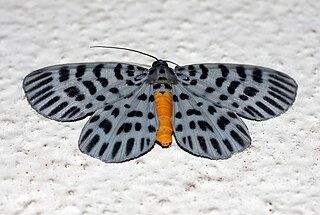Labanda is a genus of moths of the family Nolidae erected by Francis Walker in 1859.

Ozola is a genus of moths in the family Geometridae first described by Francis Walker in 1861.
Antheraea brunei is a moth of the family Saturniidae first described by Michael G. Allen and Jeremy Daniel Holloway in 1986. It is found in Borneo and Palawan.

Phyllodes eyndhovii is a noctuoid moth in the family Erebidae, subfamily Calpinae. The species was first described by Samuel Constantinus Snellen van Vollenhoven in 1858. It is found in the Himalayas, western China, Taiwan, Thailand, Sundaland and Palawan.

Titulcia is a genus of moths of the family Nolidae. The genus was erected by Francis Walker in 1864.

Zythos turbata is a moth of the family Geometridae first described by Francis Walker in 1862. It is found in southern Myanmar and on Borneo, Sumatra, Java, Peninsular Malaysia and the Philippines.

Cyana malayensis is a moth of the family Erebidae. It is found in Peninsular Malaysia, Borneo and Palawan.

Peridrome orbicularis is a species of moth in the family Erebidae. The species is found in Bangladesh (Silhet), Cambodia, India, Indonesia, Laos, Malaysia (Pinang), Myanmar, the Philippines, Thailand and Vietnam.

Asota egens is a species of noctuoid moths in the family Erebidae. It is found from Japan and the Oriental tropics, east to New Guinea.

Bracca maculosa is a moth of the family Geometridae. It is found in Sumatra, Peninsular Malaysia, Borneo and Palawan.

Xenochroa xanthia is a moth of the family Nolidae first described by George Hampson in 1902. It is found in the north-eastern parts of the Himalayas, Singapore, Sumatra, Borneo and Palawan. It is found in lowland forests.

Gunda javanica is a moth of the family Bombycidae first described by Frederic Moore in 1872. It is found in the north-eastern parts of the Himalayas, Myanmar, Sundaland, Palawan and Sulawesi. The habitat consists of lowland rainforest.
Tascina metallica is a moth in the Castniidae family. It is found on Borneo and Palawan.
Scopula urnaria is a moth of the family Geometridae. It is found on Peninsular Malaysia, Borneo and Palawan. The habitat consists of lowland dipterocarp forests.

Zythos strigata is a moth of the family Geometridae first described by William Warren in 1896. It is found on Peninsular Malaysia, Borneo, Java, Bali and Palawan and Balabac Island in the Philippines.

Nyctemera muelleri is a moth of the family Erebidae first described by Vollenhoven in 1863. It is found on Sumatra, Peninsular Malaysia and Borneo, as well as in southern Myanmar, Thailand, Vietnam and the Philippines.
Gunda subnotata is a species of moth in the family Bombycidae. It was described by Francis Walker in 1859. It is found in Singapore and on Peninsular Malaysia, Sumatra, Borneo and Palawan. The habitat consists of both montane and lowland areas.
Relluna nurella is a moth in the family Cossidae, and the only species in the genus Relluna. It is found in the north-eastern Himalayas, as well as on Peninsular Malaysia, Borneo and Palawan.

Hypochrosis subrufa is a geometer moth in the subfamily Ennominae first described by Max Bastelberger in 1908. The species can be found in lowland forests in Borneo and Palawan.

Syntypistis palladina is a species of moth in the family Notodontidae first described by William Schaus in 1928. It is found in Southern Thailand, Sundaland, the Philippines. The species prefers lowlands and may be seen the whole year up to 2,000 m.














